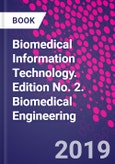Biomedical Information Technology, Second Edition, contains practical, integrated clinical applications for disease detection, diagnosis, surgery, therapy and biomedical knowledge discovery, including the latest advances in the field, such as biomedical sensors, machine intelligence, artificial intelligence, deep learning in medical imaging, neural networks, natural language processing, large-scale histopathological image analysis, virtual, augmented and mixed reality, neural interfaces, and data analytics and behavioral informatics in modern medicine. The enormous growth in the field of biotechnology necessitates the utilization of information technology for the management, flow and organization of data.
All biomedical professionals can benefit from a greater understanding of how data can be efficiently managed and utilized through data compression, modeling, processing, registration, visualization, communication and large-scale biological computing.
Please Note: This is an On Demand product, delivery may take up to 11 working days after payment has been received.
Table of Contents
1. Medical Imaging2. Biomedical Sensors
3. Biologic Computing
4. Electronic Medical Records and Picture Archive and Communication Systems (PACS)
5. Machine Intelligence in Medical Imaging
6. Health Intelligence
7. Artificial Intelligence in Bioinformatics
8. Deep Learning in Medical Image Analysis
9. Automatic Lesion Detection with 3D Convolutional Neural Networks
10. Biomedical Image Segmentation for Precision Radiation Oncology
11. Content-based Large-Scale Medical Image Retrieval
12. Natural Language Processing for Big Medical Data Analytics
13. Towards Large-Scale Histopathological Image Analysis
14. Biomedical Data Modelling and Parametric Imaging
15. Biomedical Data and Information Visualization
16. Biomedical Image Characterization and Radiogenomics
17. Medical Robotics
18. Clinical Virtual Reality: A Brief Review of the Future
19. Social and Affective Robotics for Neurodisorder Therapy
20. Telehealth and mHealth Computing
21. Internet of Things in Healthcare
22. Social Media for Healthcare
23. Data Analytics and Behavior Informatics in Modern Healthcare







